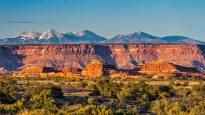In the United States, the name of a mountain, river, and other geographic location on more than 660 federal lands is being changed because the current names contain the word “Squaw,” a derogatory reference to an Indian woman.
United States Department of the Interior justifies the decision on the grounds that the word is both racist and sexist. It has never been in the Indians’ own use.
– Words are important when we strive to make public lands and waters open and inviting to everyone, regardless of background. The removal of derogatory terms has been delayed for far too long, the interior minister said Deb Haaland when announcing the start of work at the end of last year.
Haaland is the first ever U.S. government minister to belong to the indigenous people, the Laguna pueblo. As a congressman, she was the second of the first two Indian women. He says his family has lived in the state of New Mexico for 35 generations.
– Racist appointments no longer have a place in our parliaments or in the federal state. They must not repeat the legacy of oppression, Haaland said.
Why is “Squaw” offensive?
The origin of the word Squaw, which is being twisted by European newcomers, is unclear. Some thought it was neutral, others thought the word was originally meant to be an insult.
Believers in the neutral explanation take root in the appendix -skw of the Algonquin language family on the east coast of North America, which refers to the female gender, as in the Finnish suffix, for example in the word heroine. Those who did not speak the language might make the mistake of thinking that it was a whole word that meant a woman.
However, the source may also be the words ojiskwa and otsiskwa in the Mohawk and Iroquois languages, which, by imitating, Europeans reduced Indian women to sexual objects from the beginning. The words mean vagina.
Mourt’s Relation, published in 1622, tells the story of the first British settlement in North America and their relationship to the Indian population. The book refers to the queen of Massachusetts with the term “squa sachim” without an offensive tone.
Mohawk Pauline Johnson the work An Algonquin Maiden from 1892 proves another. She tells the book about the Indian heroine like this:
“Little Wanda Parka! […] It is almost crushing to have so much prejudice against the Indians that the Indian heroine is portrayed with such blatant accusation against her virtue. “
In addition to government representatives, the federal committee, which weighs the name options, includes representatives of Native Americans and Indigenous people in Hawaii, human rights experts, anthropologists, and historians.
Citizens will be able to take a position on the names online, and the U.S. Geographic Names Commission will make the final decisions by voting later this year. Five options are presented for each name. The entire list opens from this link.
Since 1890, the Nomination Commission has been in charge of deciding which names are appropriate for federal use.
The Commission has cleaned up the maps before: black derogatory names were removed in the 1960s, and the same decision was made in the 1970s about blasphemous Japanese names. Several federal states – including Minnesota and Oregon – have already made Squaw names illegal.
The Squaw Valley Winter Sports Center in California has received the most attention in the United States. The place is likely to be too familiar to many Finns because of the 1960 Winter Olympics and Finnish medal rain.
For decades, Native American tribes petitioned for a change of name. Last year, the owners finally agreed. Squaw Valley was made the Palisade of Tahoe.
Last month, Placer County, to which Palisade Tahoe belongs, gave new names to three public road links that had the word Squaw in their name. The Olympics were also remembered: one of the new names is Olympic Valley Road.
Now the projects have a corresponding change for the three private roads, as the county has the right to change the names deemed offensive.
California is also in the process of enacting a state-wide law that would clean up a map of the states of the state named Squaw by the end of next year. Federal decisions do not uphold them.
The word Squaw got its derogatory meaning as early as the 17th century from French and British fur hunters who used indigenous women as slave labor. Human rights activist Suzan Shown Harjo
One new name already approved by the Federal Naming Commission is Mestaa’ėhehe Mountain. The Squaw Mountain in Colorado was named last year at the suggestion of local tribes in honor of the 19th-century Cheyenne leader Mestaa’hehe, “Owl.”
“The name changes are much more than just physical sign changes. They acknowledge the traumas of the past and create a bridge to a common peaceful future,” commented the Alliance of the Colorado Broadcasting Corporation. Rocky Mountain PBS in the news.
Similar changes have been made in recent years to the names of sports teams, among others. The Cleveland Indians baseball team was made the Cleveland Guardians, and the Washington Redskins football team is now the Washington Commanders.
In Canada, the critically acclaimed Redmen name of McGill University’s male student sports team was changed to Redbird a couple of years ago.
Not everyone has changed their name. They have been criticized as attempts to obscure part of U.S. history.
When it was decided in the state of Arizona to change the name of Squaw Peak to Lori Piestewa, those who criticized the decision saw it as politicizing the governor. Lori Piestewa was the first female soldier to fall in the U.S. war and belonged to an Indian tribe. He died in Iraq in 2003.
Also read:
Washington Redskins name change confirmed – Finnish professor says old name damaged reputation of giant sponsors
